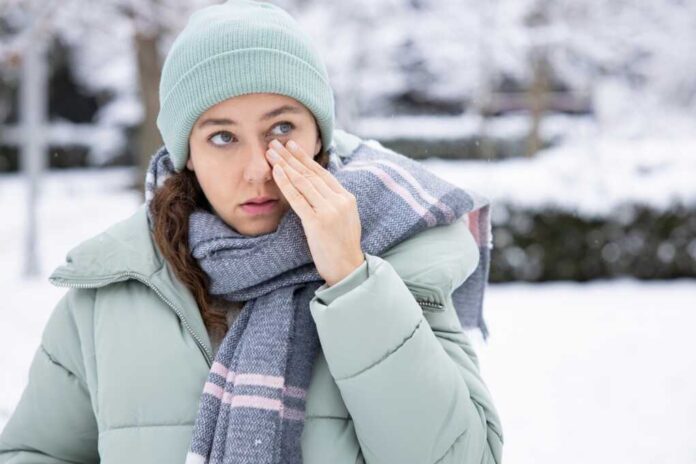
Winter unveils a landscape of serene beauty, with its crisp air and shimmering snow.
However, while we marvel at this seasonal splendor, our eyes also face unique challenges.
The very elements that craft this picturesque setting also pose risks to our eye health.
To fully appreciate the winter’s beauty, it’s crucial to take proactive steps in protecting and caring for our eyes.
- Hydration and Humidification
Winter air is not just cold. It’s often dry, both outdoors and indoors. This dryness can lead to a condition known as dry eye, where the eyes don’t produce enough tears, or the quality of tears is poor.
Symptoms include irritation, redness, and a gritty feeling in the eyes.
The solution is two-fold: internal hydration and external humidification. Drinking plenty of water helps maintain your overall hydration, which is crucial for tear production. And using a humidifier in your home can help add moisture to the air, providing relief from dry eye symptoms.
2. Shield Your Eyes from Harmful UV Rays
Snow and ice reflect UV rays, not just direct sunlight. This reflection can lead to a condition known as photokeratitis, akin to a sunburn of the eyes.
To protect your eyes, wear sunglasses or goggles that block 100% of UVA and UVB rays, even on cloudy days. This protection is critical, especially when participating in winter sports like skiing or snowboarding, where the UV exposure can be significantly higher.
3. Practice Good Screen Hygiene
The winter months often mean more time indoors, and more time staring at TVs, phones, tablets, and computers. This extended exposure to screens can cause digital eye strain, characterized by tired, dry eyes, blurred vision, and headaches.
To reduce these effects, you can practice the 20-20-20 rule: every 20 minutes, look at something 20 feet away for at least 20 seconds. This simple habit can help relax your eye muscles and reduce eye strain.
4. Be Cautious with Indoor Heating
While heating is essential for comfort in winter, it can exacerbate dry eye symptoms. Direct heat exposure, especially from sources like blow heaters or fireplaces, can dry out the eyes.
To minimize this effect, avoid sitting directly in front of heat sources and consider using a humidifier to maintain a healthier level of humidity in your home.
5. Maintain a Nutrient-Rich Diet
Nutrition always plays a vital role in eye health. Foods that provide lots of omega-3 fatty acids, Vitamins A, C, and E, and antioxidants can help protect your eyes from winter-related stress.
Including fish, nuts, seeds, and plenty of fruits and vegetables in your daily diet will provide these essential nutrients, supporting overall eye health and helping to combat dry eyes.
6. Stay Active to Boost Circulation
Regular exercise improves blood circulation, which helps in maintaining healthy eye function and can reduce the risk of age-related eye conditions.
During winter, engage in activities like brisk walking, indoor workouts, or yoga to keep your circulation in check.
7. Be Mindful of Contact Lens Care
For contact lens wearers, winter can be particularly challenging. The dry air can cause lenses to dry out faster, leading to discomfort.
It’s important to follow good contact lens hygiene, such as washing hands before handling lenses and using re-wetting drops approved for use with contacts. Also, consider wearing glasses more frequently to give your eyes a break.
8. Regular Eye Check-Ups
Winter’s harsh conditions can exacerbate existing eye conditions or reveal new ones. A check-up with an eye care professional can provide personalized advice and treatment, ensuring that your eyes remain healthy throughout the season.
As the winter landscape unfolds, our eyes need as much care and attention as the rest of our bodies. By implementing these key tips, you can help protect and preserve your vision, ensuring that you can enjoy the beauty and activities of the season with clear, comfortable eyes.






















